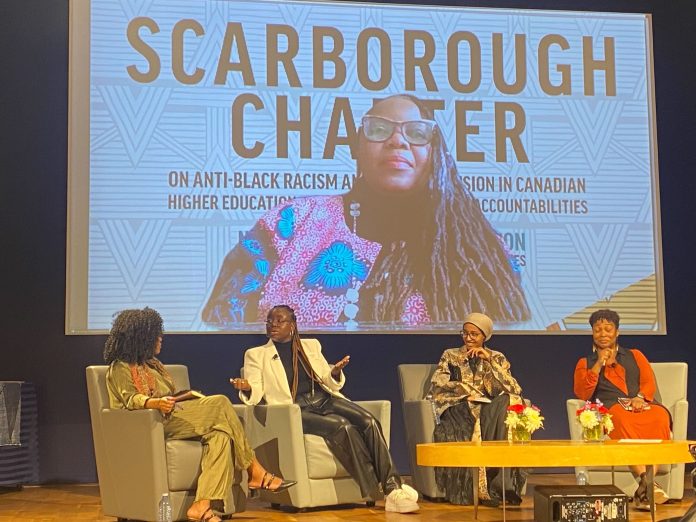
By: Chloe Arneson, News Writer
On May 14, 2022 SFU and UBC co-hosted a symposium titled, Community Making and Black Flourishing Through the Scarborough Charter. The discussion was part of a two-day event to discuss the Scarborough National Charter on Anti-Black Racism and Black Inclusion in Canadian Higher Education.
The forum sought to discuss the recent signing of the Scarborough Charter, a pledge signed by over 50 universities and colleges across Canada to promote Black representation in academia and fight anti-Black racism within higher education. The charter was signed in November 2021. By signing, UBC and SFU signified “commitments to move from rhetoric to meaningful concrete action to address anti-Black racism and to promote Black inclusion.”
Dr. Malinda Smith, professor of political science at University of Calgary, said, “The charter emerged in the aftermath of a moment of racial reckoning.” This came “after decades of Black activism and advocacy,” she added.
The charter’s action plan hopes to facilitate new anti-racism initiatives in governance, research, teaching and learning, and community engagement at the postsecondary level. Some of these actions include “reviewing and revising dispute resolution processes,” creating accessible spaces for Black students, and reducing gaps in Black representation across academia. Some of their recommendations suggest creating accessible spaces for “Black belonging, knowledge development and sharing.” Additionally, ensuring a position exists in senior administration dedicated to addressing and combating racism. This includes offering anti-Black racism education for all students, staff, and faculty.
The charter notes the responsibility higher education institutions have “in constructing the bodies of knowledge about historically groups and acknowledging the ethical responsibility to [ . . . ] support community capacity building.”
The event featured four panels made up of Black students, activists, scholars, and university administrators from both UBC and SFU. After a land acknowledgment and warm welcoming from Afro-Indigenous councillor Orene Askew, UBC president Santa Ono, and SFU president Joy Johnson joined virtually for welcoming remarks.
In her opening statement, Johnson said, “SFU signed the charter, we made the commitment, and now we’re grateful to embark on the journey of creating real systemic change.”
Dr. June Francis, special advisor to the president on anti-racism at SFU, explained there will need to be a significant amount of energy, prioritization, money, and resources dedicated to combating anti-Black racism.
“I think the fundamental issue [ . . . ] is the level to which these institutions were constructed to explicitly exclude us, to explicitly support white supremacy, to explicitly put up structures and barriers that we somehow negotiated around this. We’re here not because they invited us in through the door, but we crawled in through any hole because that’s who we are,” said Francis. She believed when institutions signed the charter, they “haven’t really thought about how much they’ll have to blow it up and transform it.”
Tiara Cash, one of the panelists at the event, said, “Institutional racism is insidious, it’s the type of racism that is meant to make you tired.” This sentiment was echoed throughout the event.
Binta Sesay is an equity and inclusion assistant at UBC who spoke on her experience as a Black student at UBC. “There’s a lot of listening, but just surface listening. Not listening to change,” said Sesay. One of the barriers Sesay has noticed is “the process of implementation [ . . . ] from a foundation of white supremacy.” Universities tell students they hear them and will make changes, but according to Sesay no action is made. During this process students get exhausted which results in students giving up.
“This is us telling the university what we need,” she continued. According to Sesay, if the decision makers at post-secondary institutions listened to what they are asking for, “it is enough to make the change we want to see. This is us expressing how fed up we are, but also expressing the unsung heroes that kept us open to these conversations and holding on.”
The full video recording of this event can be found on UBC’s website.





































